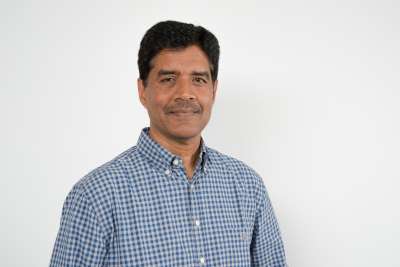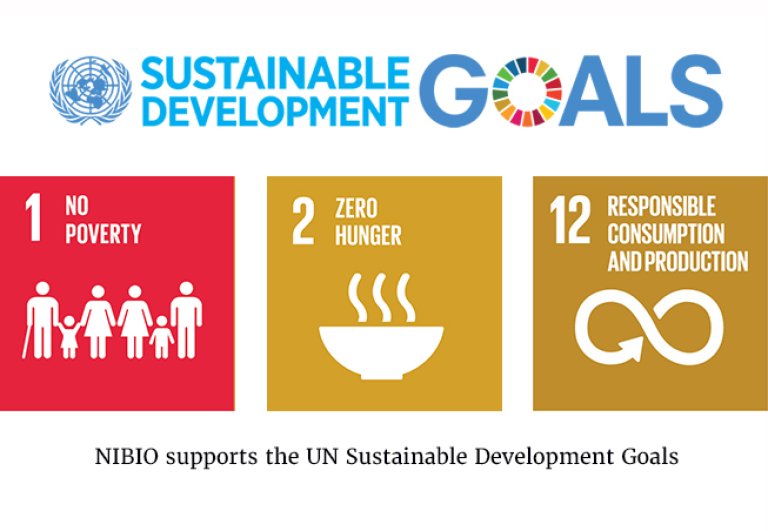InnovAfrica meeting held in Rwanda

InnovAfrica farmer at a project site in Rwanda. Photo: Mufunanji Magalasi.
Last week, InnovAfrica’s project partners met to review the project’s progress. The work carried out so far includes the initiation of six multi-actor platforms, data collection from 600 farmers in each of the six case countries and focus group discussions to assess the current situation and plan future actions.
InnovAfrica’s main goal is to address food and nutritional security through improving smallholder adaptive capacity. Introducing innovative sustainable agriculture technologies in six African countries, the project works closely with smallholders at the local level and stakeholders at the national and Pan African level.
The second all partners consortium meeting of InnovAfrica took place in Kigali, Rwanda on February 13-16. The meeting was hosted by Rwanda Agriculture Board (RAB) and NIBIO which is the main project coordinator of the project. More than 60 participants representing 21 organizations from 18 countries took part.
The meeting marked an important milestone in the implementation of the project as it reviewed the progress of the work made so far, which included the empirical work kick off in the six case countries, the initiation of six multi-actor platforms, a major data collection exercise covering 600 farmers in each of the case countries, as well as focus group discussions to assess the current situation, gaps, opportunities, and plan future directions.

Hopes to link InnovAfrica to “Science Agenda for Africa”
Speaking at the meeting, one of the Stakeholder Board member (SAB), Dr. Kaymbe Raymond from the Ministry of Agriculture, Livestock and Fisheries, expressed his appreciation for the various components the project is addressing. This includes value chains, gender, knowledge generation and extension. He said he clearly sees the linkage between InnovAfrica and ongoing programs such as ASDP in Tanzania and similar.
”You have the found the track and that is commendable, and I hope you continue in the same spirit. You must look out and should prepare for an exit strategy already. Where will this project dock once it is over? How do we leave a footprint after InnovAfrica ends, with so many partners and more than 70 scientists?” Dr.Yemi Akinbamijo, another SAB member pointed out at the meeting. He assured that FARA has an interest, and that he will do his best to link InnovAfrica to “Science Agenda for Africa”.
Fits into the African agenda
Dr. Denis Kyetere, Executive Director, commented that he really appreciated the progress made in the project so far, but stressed that there still are some challenges, for example related to monitoring and evaluating the project, the SAI’s chosen and their appropriateness. He asked the team to address all the gaps/challenges in the course of the meeting.
Professor Agnes Mwang’ombe at the University of Nairobi said that the project work fits very well into the African agenda, among other things the Brachiaria intervention. She mentioned Vision 2030 – a new government initiative in Kenya focusing on food and nutrition security.
”Initiatives such as InnovAfrica work will definitely help in countries like Kenya to realize such agendas,” she said. She also emphasized the work being done in regard to short courses for rural women and youth to increase their awareness and job opportunities. “In brief, there is a great opportunity for InnovAfrica in the next three years,” she said.
Smallholders are InnovAfrica’s primary target group
At the meeting, all the work package leaders, case country managers and other partners shared the progress of work and experiences from the field visits as well as future plans. NIBIO was represented by Sekhar Nagothu, Esther Bloem, Mehreteab Tesfai and Roald Sørheim.
In his presentation, Dr. Sekhar, the Project Coordinator of InnovAfrica, highlighted that good teamwork and cooperation has helped to achieve the progress as planned in the first eight months of the project. “This cooperation will be strengthened further when we address the challenges ahead,” he said emphasized that the primary target group of InnovAfrica are smallholders, especially youth and women.
Director Dr. Jacob Mignouna from the BecA-ILRI Hub stressed the importance of integrating national and international initiatives within the six countries and regions - taking technology to scale.
Another highlight of the meeting was a whole day field visit to an InnovAfrica project site in Rwanda and the following discussions with the farmers and MAP members. During the visit, the project team was exposed to innovative Brachiaria forage livestock systems that small farmers were taking up in the project.
Contacts


InnovAfrica
InnovAfrica aims to improve food and nutrition security by integrating sustainable agricultural intensification systems and innovative institutional approaches to increase income and enhance smallholder adaptive capacity in Sub-Sahara Africa.
The project will test ways of intensifying agricultural food production in a sustainable way; these agricultural systems will be communicated to smallholder farmers in several African countries via smart phone apps, social media and village-based ‘Knowledge Centres’. In addition the project will publish papers and policy briefs to be used in policy dialogue forums and to contribute towards knowledge based policy formulation.
Funded by Horizon 2020 / EU.
Website: www.innovafrica.eu


Contacts

